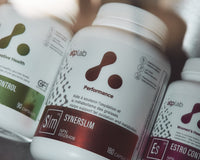Superior Hydration with Electrolytes XL

Hydration means a lot more than just water. To properly hydrate, we require Magnesium, Sodium, Potassium, Calcium, Zinc, Chloride, and other minerals.
In fact, in some instances, high consumption of water paired with under consumption of these minerals can cause dehydration.
For example, consuming excess water without electrolytes will dilute our sodium concentration. This leads cells to take on too much water and swell, leading to dehydration as the body’s electrolytes are also diluted.
Performance is impaired when dehydrated
It is well known that dehydration impairs athletic performance. Research shows that it is common for athletes to lose 6-10% of body weight in sweat during sporting events. But physical performance can be impaired beginning at just 2% loss of body weight in sweat.
The impairment affects a number of domains. Mild levels of dehydration can impair endurance, increase fatigue, alter thermoregulatory capability (prevent your body from cooling itself down in the heat), reduce motivation, and increase perceived effort. Rehydration can reverse these deficits, and also reduce oxidative stress induced by exercise and dehydration, which could improve recovery.
Dehydration also impairs mental performance
Mild dehydration produces alterations in a number of important aspects of cognitive function such as concentration, alertness, and short-term memory in children (10–12 y), young adults (18–25y) and in the oldest adults, 50–82y. As you can see, everyone needs these essential minerals regardless of age or athleticism.
What else depletes electrolytes?
We’ve established that sweating and rigorous activity causes this. As does general underconsumption of water and/or electrolytes. But there’s a few other important scenarios worth mentioning.
Ketogenic diets, fasting, alcohol consumption, and chronic stress can all rapidly deplete our mineral content.
Alcohol quite simply dehydrates us. Part of what makes a bad hangover a bad hangover is the amount of dehydration and mineral depletion it has caused.
Low carb and keto diets INCREASE our need for these minerals because low insulin causes us to excrete more. Furthermore, if we are generating ketones (during a prolonged fast or ketogenic diet), these also cause us to excrete more of these minerals because they create an acidic environment. This demands buffering (of pH) via alkaline minerals like calcium, magnesium, and sodium.
A failure to consume adequate amounts of these minerals whilst on a ketogenic diet is what contributes to the “keto flu” (cramping, fatigue, headaches, irritability and so on). This can often be rapidly resolved with electrolyte intake.
Fasting can be incredibly therapeutic but also causes excess mineral/electrolyte loss due to similar mechanisms to ketogenic diets.
Chronic stress is another example; high cortisol and adrenaline is present when we’re stressed and this too depletes magnesium, calcium, zinc, potassium, and other minerals.
So where do we get these minerals?
We can get some in food, but unfortunately the amounts found in food have drastically declined since the introduction of modern farming practices. Factors like chemical fertilizers, higher CO2 content in the air, larger scale cropping, and deficient soil, among other factors, are the cause of this.
For example, one study published in Nutrition and Health found that the nutrients in vegetables and fruits has decreased by 15% and 16%, respectively, since the 1940s. This includes sodium, magnesium, and calcium in particular.
So how do we get enough?
Look no further than Electrolytes XL by ATP Labs. Every scoop contains magnesium, sodium, potassium, calcium, and zinc in meaningful doses. To support hydration aswell as water balance, neuron signalling in your brain, proper digestion, enzymatic reactions, muscle contraction, bone health, buffering pH in the body, recovery from stress and exercise, blood sugar control, quality sleep, mental health and so much more.
You’ll also find 3g of D-Ribose, and 500mg of Beet Root Extract.
Beet root extract is a natural source of nitrates, betaine, and vitamins and minerals like vitamin c, potassium, manganese, and folic acid; all of which will further support your hydration requirements.
D-Ribose is a naturally occurring carbohydrate molecule which supports ATP production. In fact, D-Ribose supplementation has been shown to maintain performance during longer workouts and improve recovery.
While this is technically a carbohydrate (a simple sugar) the amount contained in the bottle is nowhere near enough to deter you from your fasting or ketogenic diet goals. The 3g of ribose only supplies approximately 3g of carbohydrates, or 13 calories.
Electrolytes XL contains zero artificial flavours or sweeteners, and is informed sport certified. You can find it in cherry, lemon, peach, or orange.
You can use it before, during, and after exercise, during fasting, during a ketogenic diet, anytime to rehydrate, or even as a hangover fix.
References
Paik IY, Jeong MH, Jin HE, et al. Fluid replacement following dehydration reduces oxidative stress during recovery. Biochem Biophys Res Commun. 2009;383(1):103‐107. doi:10.1016/j.bbrc.2009.03.135
Cheuvront SN, Carter R 3rd, Sawka MN. Fluid balance and endurance exercise performance. Curr Sports Med Rep. 2003;2(4):202‐208. doi:10.1249/00149619-200308000-00006
Logan-Sprenger, Heather M et al. “The effect of dehydration on muscle metabolism and time trial performance during prolonged cycling in males.” Physiological reports vol. 3,8 (2015): e12483. doi:10.14814/phy2.12483
Bo Lönnerdal, Dietary Factors Influencing Zinc Absorption, The Journal of Nutrition, Volume 130, Issue 5, May 2000, Pages 1378S–1383S, https://doi.org/10.1093/jn/130.5.1378S
DiNicolantonio, James J et al. “Subclinical magnesium deficiency: a principal driver of cardiovascular disease and a public health crisis.” Open heart vol. 5,1 e000668. 13 Jan. 2018, doi:10.1136/openhrt-2017-000668
Murray B. Hydration and physical performance. J Am Coll Nutr. 2007;26(5 Suppl):542S‐548S. doi:10.1080/07315724.2007.10719656
Thomas D. The mineral depletion of foods available to us as a nation (1940-2002)--a review of the 6th Edition of McCance and Widdowson. Nutr Health. 2007;19(1-2):21‐55. doi:10.1177/026010600701900205
Davis, D. R. (2009). Declining Fruit and Vegetable Nutrient Composition: What Is the Evidence?, HortScience horts, 44(1), 15-19. Retrieved Jun 1, 2020, from https://journals.ashs.org/hortsci/view/journals/hortsci/44/1/article-p15.xml
Hellsten Y, Skadhauge L, Bangsbo J. Effect of ribose supplementation on resynthesis of adenine nucleotides after intense intermittent training in humans. Am J Physiol Regul Integr Comp Physiol. 2004;286(1):R182‐R188. doi:10.1152/ajpregu.00286.2003






